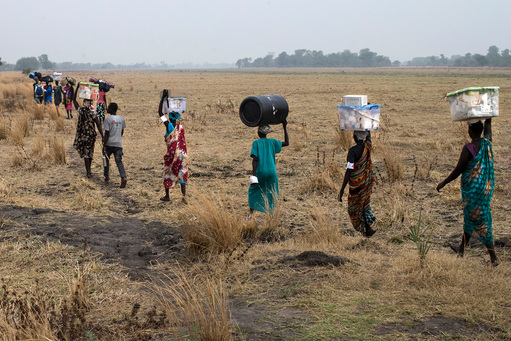The international medical charity Médecins Sans Frontières (MSF) said thousands of people are caught between the frontlines of the fighting, and health facilities have been attacked in Leer and Mayendit in Unity region.
The aid agency said in a press release seen by Radio Tamazuj on Thursday that women, men and children in Leer and Mayendit counties are enduring extreme levels of violence, including gang rapes and mass killings and that villages have been looted and burnt down, and food reserves and other possessions have been destroyed.
The high level of violence prevents many people from reaching basic services, including healthcare, says the medical humanitarian organisation Médecins Sans Frontières/Doctors without Borders (MSF).
“They entered the village at six o’clock in the morning, when we were still sleeping. We woke up and ran. We didn’t have the time to take anything with us”, explains a mother of nine children. “I saw them shooting at people. My son was hit in the chest by a bullet. They started to burn the houses down, with people still inside. The worst thing about these attacks is the way they destroy everything.”
The aid group said the high level of violence forced thousands of civilians to seek refuge wherever they can in the bush, swamps and islands, with some people having been forced to move several times because of repeated attacks.
“For now, the majority of the cases we are seeing are acute watery diarrhoea, respiratory and skin infections, as well as musculoskeletal disorders, with patients presenting muscle or joint pain”, says Georgina Brown, Medical Coordinator for MSF in South Sudan. “All of these medical issues are directly related to poor living conditions. With the rainy season coming, more people could become sick.”
MSF said its teams have provided basic medical care to communities that they could reach, including to a significant number of people who have experienced sexual violence.
“In one of the villages we managed to access, we treated 21 survivors of sexual violence in 48 hours. A few days later in a different area, we treated another 20 survivors. These numbers we’re seeing are very worrying”, says Brown. “However, we know many survivors don’t receive any treatment. People are still hiding in the bush and swamp areas because they’re afraid of the ongoing violence, and so they don’t have access to basic services, including healthcare. Until the violence calms down, we can’t reach these people to give them the treatment they need”.
It further said attacks against healthcare facilities are cutting off local communities from much needed medical assistance.
The organization called on all armed actors to immediately put an end to the violence against the local population in Leer and Mayendit counties.




